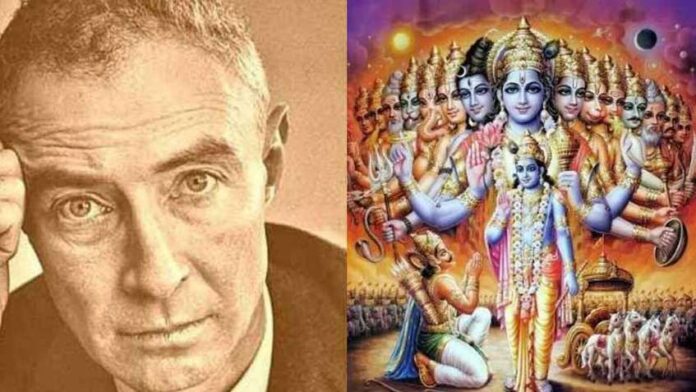On 21 July 23 a Hollywood film, ‘Oppenheimer’, was released in India, which as per its makers is a biopic on the life of Julius Robert Oppenheimer a theoretical physicist, who headed Project Manhattan for developing the first nuclear bomb for the US. It gathered global headlines for two reasons. First its unprecedent box office success and second an Indian minister’s strong criticism for including a verse from the Bhagwad Gita in a situation that is considered as inappropriate and vulgar .
By Brig (Dr) Ashok Pathak (Retd.)
Gita is one of the holiest spiritual works revered across the globe including by Robert Oppenheimer him self . Incidentally the film was seen by the Indian censor board and approved for screening with U/A certificate allowing children below 12 years of age to watch the film with parental guidance.
Our objective in this article is not about the controversy centered around the situation in the film when the verse is read by the leading lady. We will look deeper into the subject. Our scrutiny will focus on the lack of justification for picking up a verse from such a profound work to legitimize the wanton destruction. This would need expanding the canvas to include at what stage and for what purpose Lord Krishna said those words. There after we will analyze how valid is the justification given by President Truman to Robert Oppenheimer whose conscious was shaken when he realized (after the second atomic bomb was dropped on Nagasaki which as per Oppenheimer was entirely unnecessary) the monster he had unleashed on the humanity. It speaks volumes of Oppenheimer’s honesty and candid acceptance that he had made a big mistake and no more atomic bombs should be made. From this point in time Oppenheimer turned a traitor from being the biggest American hero. He was hounded and tormented by the state till he died.
The Verse and its Context in Gita
The actual verse reproduced from Gita Supersite developed and maintained by IIT Kanpur, is given below: (Chapter 11 verse 32)
कालोऽस्मि लोकक्षयकृत्प्रवृद्धो
लोकान्समाहर्तुमिह प्रवृत्तः।
ऋतेऽपि त्वां न भविष्यन्ति सर्वे येऽवस्थिताः
प्रत्यनीकेषु योधाः।।
First before the rival armies were arrayed against each other on the battlefields around Kurukshetra the Pandavas (Krishna was with Pandavas as a guide) were subjected to numerous atrocities by their cousins Kauravas. Krishna tried his best to broker peace between the Pandavas and Kauravas even offering that Pandavas will accept even a small piece of land for peace. Kauravas refused to give even an inch of land to Pandava princes. This brought the two sides to war. Hence as Dr. S Jaishankar says in his book, ‘The India Way’ a righteous narrative was built in favour of Pandavas.
Another and perhaps the most relevant aspect in this context is in the first chapter in Bhagwad Gita when Arjun -one of the greatest warriors of his time, is overwhelmed by pity and despair finding his own kith and kin, elders, revered teachers arrayed against him in the war and whom he would be killing to win. He declares that he would better be killed by his adversaries than to soak his hands with their blood. Chapter 1 verse 46.
धार्तराष्ट्रा रणे हन्युस्तन्मे क्षेमतरं भवेत् । ।
Krishna’s teachings commence from here when Arjuna is overtaken by despair. His first advice to Arjun in the beginning of the second chapter is that you do not think of the unthinkable in the battlefield. When faced by an unreasonable, cruel and tyrant enemy your job is to stand up and fight. Chapter 2 verse 37:
धर्मसंस्थापनार्थाय संभवामि युगे युगे ||
In the verse where Krishna is described as the Supreme destroyer it is about the soldiers on both the sides. The ordinary citizens who are not involved in war fighting are not part of this destruction. It is only about the two armies who decided for war in spite all attempts to broker an honorable peace. Chapter 11 verse 33.
मयैवैते निहताः पूर्वमेव निमित्तमात्रं भाव सव्यसाचिन् ||
Ethics of Mahabharata did not allow the warriors to kill hapless civilians. In fact during those days and even till the times of Mauryan empire battles were fought in areas that prevented civilian casualties and damage to the flora and fauna[15], [16]. Robert Oppenheimer perhaps missed this most critical point in Bhagwad Gita when he was exulting after the first atomic bomb was dropped on Hiroshima.
Bombing of Hiroshima and Nagasaki in WWII
To start with the bomb was dropped on innocent Japanese civilians that included women, children even unborn babies, schools, hospitals and civic amenities that had no relevance to the war. The deaths and devastations were not limited to that point in time but the gamma ray radiations, nuclear contamination played havoc with the future generations, babies that were yet to be conceived and born! It was not an act of war fighting -that Pandavas and Kuravas were engaged in, but was an act of cold-blooded revenge, testing of a deadly weapon on innocent people. Was it necessary to end the war? Not really. First the Japanese were in full retreat at that time. Post-war investigators concluded that the atomic bombs were not central to the decision to surrender. Secondly dropping of the two atomic bombs preceded by insane and devastating bombing of Japan by the Twenty First Bomber Squadron commanded by Major General Curtis Le May from January 1945 onwards. The B29s that were taking off from American air bases in Guam (in the Pacific Ocean from where Japan was in range) dropped high incendiary napalms on the Japanese cities. Le May’s bombers burnt down ‘68.9 percent of Okayama, 85 percent of Tokushima, 99 percent of Toyama, sixty-seven Japanese cities in all over the course of half a year (Pp 187). On 06 August 1945, a specially outfitted B 29 flew form the Guam air base and dropped the first atomic bomb on Hiroshima. Even when the horrific devastation of Hiroshima was reported (a devastation that made Oppenheimer exult and remember the verse from Gita) Le May continued with his obsessive burning of Japanese cities. On 9th August 1945 when the second atomic bomb was dropped on Nagasaki Le May still continued. He stopped only on 14 August 1945 when the news of Japanese surrender prevented any more hostilities.
Gladwell provides a very depressing picture of impact of napalm bombings on Tokyo. “Mothers, ran from the fire with their babies strapped to their back only to discover – when they stopped to rest, that their babies were on fire……..People tried to hang onto steel bridges until the metal grew too hot to the touch, and then they fell to their death…….the flames carrying the smell of burning flesh in the target area were so high that the air craft that returned to the base after this bombing were required to be fumigated because they were stinking from the smell of burning human flesh”.
The Contrast
The Battlefields of Bhagwad Gita: A war that is about to start since one of the sides (Kauravas) were not willing to concede even an inch of the territory that belonged to their adversary. Arjun the powerful and capable warrior unwilling to fight out of pity and despair for his cousins, elders and teachers arrayed against him instead he would prefer being killed by his adversaries without a fight. Krishna advises him against this act urging him to stand and fight. Krishna also assures Arjun that since he is fighting a war to establish an era of righteousness he will win, The soldiers in both the armies will perish in this devastating war which Krishna tried His best to prevent. There would be no harm to the those who were not participating in the war.
Oppenheimer’s Bomb: The first atomic bomb (developed in Project Manhattan led by Oppenheimer) was dropped on Hiroshima on 6 August 1945 when the Japanese had already lost the war and were looking for some face saving excuse to surrender. The bomb killed 135,000 innocent people not participating in the war, in a few seconds. Oppenheimer was quite comfortable with killing of these Japanese citizens. The second bomb dropped on Hiroshima killed 64000 innocent citizens. This is what perturbed Oppenheimer’s conscious since as per him dropping the second bomb was unnecessary. Incidentally even before the first atomic bomb was dropped the fire bombing of Japanese cities (using napalm) was continuing since January 1945 that had killed more innocent citizens than what the two bombs did. As per Major General Curtis Le May dropping the atomic bomb was not necessary since his bomber command had already been on destruction spree.
Conclusion
This film has thrived on the human tendency to fantasize, find something tantalizing, larger than life spectre. The film makers also package the audio visual illusion in a manner that the viewers’ intellect is numbed. This has led to huge commercial success of the film besides selling a carefully prepared narrative.
Some analysts have praised the liberalism of American academia and Hollywood. They also aver that US has had a proud history of defending freedom of speech and thought and protecting the institutions of the state from their takeover by authoritarian and sectarian forces.
There are three very big holes in this lavish praise. First if a few in the American academia had cared to learn Sanskrit, read and internalise the knowledge in Bhagwad Gita (as Oppenheimer is said to have done) they would have observed that the context in which the verse was used by Oppenheimer and shown in the film is grossly out of synch with what was meant in the world famous epic. Second, people in Hollywood and certainly in the American academia would have known that there are certain human activities during which Holy Scriptures are not read. Most of the viewers of the film must have been just ‘watching’ and not ‘listening’. Thirdly, the free speech and American liberalism did not prevent the US from stockpiling the biggest nuclear arsenal. Neither did the institutions of the state were able to prevent their liberal nation from killing of innocent civilians in Vietnam, Iraq and Afghanistan. In essence the verse has been used as a shield to hide the most heinous crime on humanity in WWII and is an attempt to allow America to play God to rest of the world.
This article first appeared in www.vifindia.org and it belongs to them.








